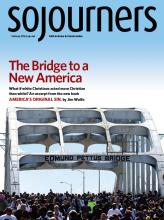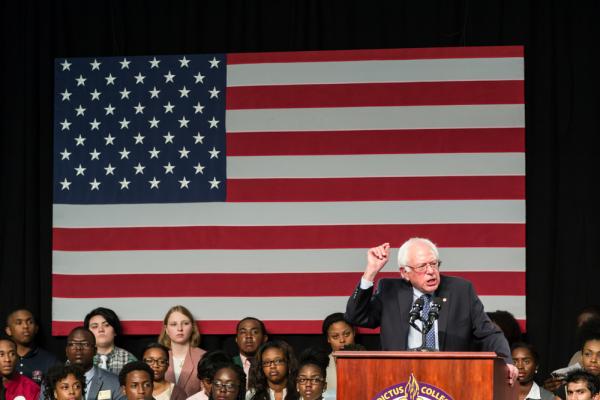WE NEED TO overthrow...this rotten, decadent, putrid industrial capitalist system.”
So wrote Dorothy Day, the Catholic Worker co-founder whom Pope Francis recently held up to the U.S. Congress as a great exemplar of the American spirit.
In the centuries since the rise of capitalism, millions of Christians, like Day, have sought not only to bind up the wounds of the poor, but also to create a world in which people will not be impoverished by low wages, unemployment, discrimination, or plain bad luck. Day ended up advocating a sort of communitarian anarchism. But for many other Christians—from Mother Jones to Dom Hélder Câmara to Martin Luther King Jr.—the name for that alternate system has been “socialism.” And, after long decades during which acceptance of the existing economic order seemed inevitable, in 2016 the question of socialism is not only on the agenda again but, in the Democratic presidential primaries, on the ballot.
This is especially surprising because any alternative to corporate capitalism was widely declared dead after the 1991 collapse of the Soviet Union, which had called itself a socialist state and imposed its rule by force. Its failure, in the end largely economic, was rightly seen to discredit the Marxist-Leninist version of socialism that relied on centralized, coercive state power to manage the lives of its citizens. In the wake of the collapse, the West flooded the formerly communist states with free-market economic gurus to guide a sort of capitalist extreme makeover, and the end of history was declared.
But then global capitalism had its own collapse in 2008. In the U.S., the dream of upward mobility is dying. According to the U.S. Department of Labor, since 1973 the inflation-adjusted average hourly earnings for workers with a high school degree or less have declined; more-educated workers have barely stayed even. Meanwhile, according to the Economic Policy Institute, the inflation-adjusted income of the top 1 percent has risen 138 percent since 1979. A generation has arisen that sees its prospects declining. For this generation, “socialism” has little to do with the Soviet Union; it’s just another insult that Fox News hurls at the president most of them supported.
So for the first time in 100 years, a democratic socialist, Sen. Bernie Sanders of Vermont, is waging a serious U.S. presidential campaign. Since his campaign began, the percentage of Americans who say they are willing to vote for a socialist has risen. In fact, for the past five years, U.S. public opinion polls have shown increasingly favorable associations with the word “socialism.” Among millennials, the S-word’s positives are now higher than its negatives.
Even in the Catholic Church, consideration of socialist alternatives no longer seems taboo. Since the days of Pope John Paul II, liberation theology has been on the outs in Rome, but last year Gustavo Gutierrez, who gave the movement its name with his 1971 book, A Theology of Liberation, was welcomed to the Vatican to address a conference. This is the same man who famously proclaimed that Christian theology needs to speak “of social revolution, not reform; of liberation, not development; of socialism, not modernization of the prevailing system.”
Read the Full Article

